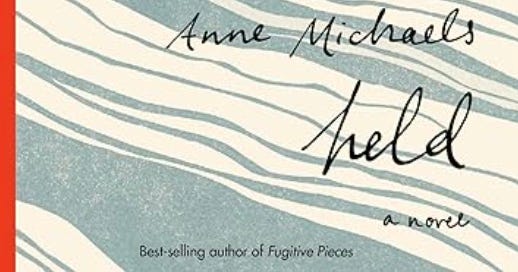BookLife Review by Carol O’Day: Held, a Novel (Anne Michaels, author)
Literary fiction, 2024 Booker Prize shortlist nominee, mysticism, WWI and WWII, ghosts, spirits, multi-generational, non-chornological narrative, mental health, war zones, veterans.
Held, a Novel, by Anne Michaels, has been shortlisted for the 2024 Booker Prize. The Booker Prize is awarded each year to “the best sustained work of fiction written in English and published in the UK and Ireland” as evaluated by a distinguished panel of judges. Held is evocative, poetic and mystical. However, it also is chronologically and narratively confusing and may feel inaccessible for many.
Michaels’ narrative leapfrogs back and forth over four generations, following individual ancestors and descendants of John and Helen. We meet John in the opening pages lying injured on a WWI battlefield in France in 1917. Helen is his wife waiting at home in England. After John returns home, he struggles with what we now know was PTSD. The novel advances in somewhat cryptic and untethered chapters as far forward in time as 2025 and briefly backward to 1908, 1910 and 1912. The author skips into the 1950s, 60s and 80’s along the way, but not in chronological order. The reader visits France, England, Estonia and Finland over the course of the book. The connections and relationships between the characters are sometimes difficult to discern or are merely intimated. The irregular chronology and the absence of a through character render the book challenging to follow.
That said, the writing and content is mystical, evocative and haunting. Early in the book, John, a photographer, begins taking portraits of returned warriors and captures in his portraits images of ghosts. The ghosts are related to the person photographed and include a deceased mother, a son killed in the war, and a lost love. John’s mental state is fragile but he shares the images with his customers as an act of service to reunite his customers with the spirits of their beloved. Michaels introduces this thread of mysticism and carries it through the book, tracing ancestors and descendants and often imbuing them with mystical foresight and connection to the realm of the metaphysical. Michaels sews a web of connection between the living and the dead, and threads the needle of ancestry and descendants by allowing her characters to miss and long for their deceased loves the grief and longing that surrounds death. Yet the narrative is disjointed. Helen, John’s widow, spins a tale of experiences to a painter she meets when she is in her sixties and for whom she models nude. Helen and John’s daughter, Anna, is a nurse. The inference is that Anna married Peter and the two had a daughter named Mara. Anna is away from home for work, and Peter and Mara develop a deep bond. Mara, likewise travels to warzones and refugee camps to care for the wounded, until she meets war correspondent, Alan. The lines blur at times, and the reader is unsure of exactly which generation is the subject of the chapter, and who is related to or descended from whom.
Michaels writes:
We think of history as moments of upheaval when forces converge, the sudden upthrust of the ground we’re standing on, catastrophe. But sometimes history is simply detritus: midden mounds, ghost nets, panoramic beaches of plastic sand. Sometimes both: a continual convergence of stories unfolding too quickly or too gradually to follow; sometimes, too intimate to know.…History is liminal, the threshold between what we know and can’t know; land and sky a single coordinate plane in the mist. The one who rescues the rescuer. Terminal lucidity. The few kilometers, a turn of the head, between surplus and famine. Surgery by the light of a car battery. Stars invisible in daylight.
For Michaels, history consists of, or at least is best depicted by, a stream of intimate stories of ordinary daily lives and losses, of living, dying and longing. By skipping across the generations of a single family, and recounting and reviving ancestors and ghosts, Michaels sketches a history of a space and time in Europe from, between and through two world wars into a new millennium. She is ever cognizant of those who paved the way before each subsequent generation; she preserves and incorporates the spirits of the deceased into each subsequent generation by allowing her characters to accept and even embrace a magical mysticism as a salve to their souls.
Support BookLife: Reviews for Readers and independent bookstores by purchasing Held, a Novel using the link below:





